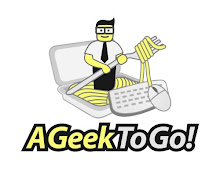AOL and Time Warner: A Sympathy Note
and that stupid merger cost me my job at CNN, thus turning me into A Geek To Go!-Miles West
Jeff Bertolucci
May 29, 2009 12:54 pm

"We believe AOL will then have a better opportunity to achieve its full potential as a leading independent Internet company," said Time Warner CEO Jeff Bewkes in a statement.
That's always what people say in a divorce. Better opportunity is code for don't let the door hit you on the way out.
Full potential? While I wouldn't say that Time Warner expects AOL to wither away and die, it sure looks that way. A quick look at AOL's prospects makes it clear why Time Warner has decided to move on.
 While AOL remains a major Internet service provider with about 6.3 million subscribers, it has been letting that business waste away for years. It's hard to believe that, at its peak, AOL claimed as many as 34 million subscribers. But it lacked the infrastructure and management savvy to transition from dial up to broadband, and its ISP business remained stuck in the 90s. Today, AOL's primarily income source is its declining online advertising generated by its eclectic mix of content sites, including the AOL.com portal, gossip site TMZ.com, and MapQuest. There's a business model there, certainly, but AOL is small potatoes compared to competitors Google, Yahoo, and Microsoft -- not the Internet behemoth Time Warner wants it to be. (For a refresher, check out "20 Years of AOL Annoyances and Foul-Ups.")
While AOL remains a major Internet service provider with about 6.3 million subscribers, it has been letting that business waste away for years. It's hard to believe that, at its peak, AOL claimed as many as 34 million subscribers. But it lacked the infrastructure and management savvy to transition from dial up to broadband, and its ISP business remained stuck in the 90s. Today, AOL's primarily income source is its declining online advertising generated by its eclectic mix of content sites, including the AOL.com portal, gossip site TMZ.com, and MapQuest. There's a business model there, certainly, but AOL is small potatoes compared to competitors Google, Yahoo, and Microsoft -- not the Internet behemoth Time Warner wants it to be. (For a refresher, check out "20 Years of AOL Annoyances and Foul-Ups.")
AOL will solder on, but I doubt it'll ever reclaim its past glory -- or notoriety, depending on your point of view. The company formerly known as America Online was once The Great Satan to tech sophisticates. PC World contributor Dan Tynan efficiently summarized AOL's sins in his 2006 article, "The 25 Worst Tech Products of All Time:"
"How do we loathe AOL? Let us count the ways. Since America Online emerged from the belly of a BBS called Quantum "PC-Link" in 1989, users have suffered through awful software, inaccessible dial-up numbers, rapacious marketing, in-your-face advertising, questionable billing practices, inexcusably poor customer service, and enough spam to last a lifetime. And all the while, AOL remained more expensive than its major competitors. This lethal combination earned the world's biggest ISP the top spot on our list of bottom feeders."
Yes, everything Dan wrote was true. So why do I feel sorry for AOL? Perhaps because its Time Warner split represents an end of an era. Then again, maybe not. Honestly, I'm not sure.
In the tech universe of the 90s, AOL users were the real nerds. Clueless newbies who needed the Internet with training wheels. An AOL e-mail address was the very definition of uncool.
I had an AOL e-mail address.
During those years I wrote a monthly Windows column for a now-defunct magazine called Computer Currents. My editor Robert Luhn, another AOL user, once wrote -- and I'm paraphrasing here -- that the main reason he kept his AOL e-mail account was because it pissed off the Internet snobs. I thought that was hilarious. It summed up my philosophy too.
There were times I'd be interviewing Web gurus who'd ask for my e-mail address. When I'd say, "aol.com," I'd often hear a snarky comment or a moment of stunned silence. One guy blurted out: "Oh, you (AOL) people are scum, JUST SCUM!"
He was joking, sort of.
I still use my AOL e-mail address, but the snarky comments ended years ago. Nobody cares about AOL anymore. The company may still be a viable business, but it has lost its power to influence or enrage.
The good news? Fewer CD-ROMs in landfills.


0 Comments:
Post a Comment
Subscribe to Post Comments [Atom]
<< Home